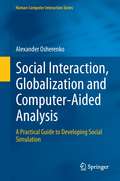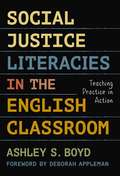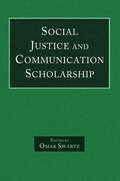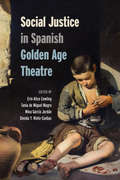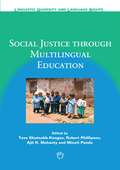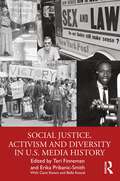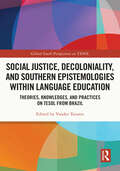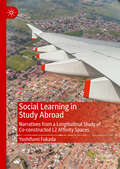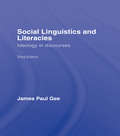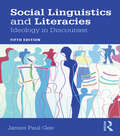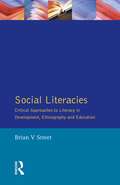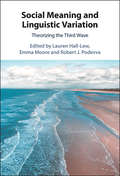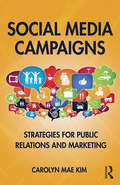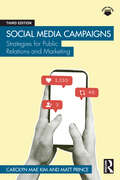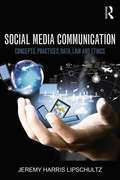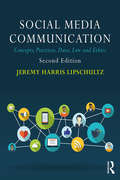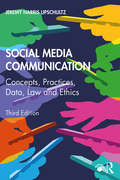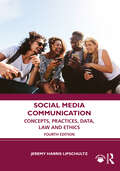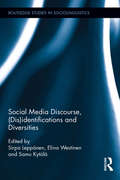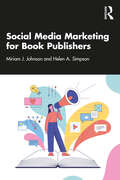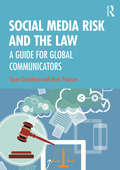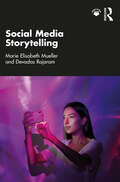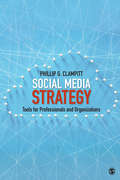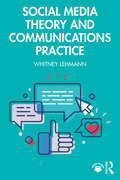- Table View
- List View
Social Interaction, Globalization and Computer-Aided Analysis
by Alexander OsherenkoTackling globalization is a great challenge - it is both extremely beneficial and essentially problematic. This comprehensive, multidisciplinary study confronts this ambivalence through the use of computer simulation. It discusses the findings of social interaction and social simulation through the use of understandable global examples. Readers can use this book as a tool to outline significant aspects of intercultural simulation and highlight the issues that need to be considered in the reader's analysis. The author leads the reader via sequential narration from a colloquial description of intercultural situations to final simulation prototypes; each step is accompanied by descriptive comments and program code. Social Interaction, Globalization and Computer-aided Analysis shows the reader how to acquire intercultural data from seemingly inconceivable information sources. Researchers and software developers engaged in interdisciplinary research projects in the field of Human-Computer Interaction will find this book to be a useful companion in their work. Alexander Osherenko is the founder of the start-up company Socioware Development, which implements psychologically-, sociologically- and culturally-aware software that scrutinizes information based on the findings of the cognitive sciences. Solutions created by Socioware Development can be implemented across a vast spectrum of industries, including car manufacturing, insurance and banking, Internet search engines and e-retailers.
Social Justice Literacies In The English Classroom: Teaching Practice In Action (Language And Literacy)
by Deborah Appleman Ashley BoydThis timely book focuses on different social justice pedagogies and how they can work within standards and district mandates in a variety of English language arts classrooms. With detailed analysis and authentic classroom vignettes, the author explores how teachers cultivate relationships for equity, utilize transformative language practices, demonstrate critical caring, and develop students' critical literacies with traditional and critical content. Boyd offers a comprehensive model for taking social action with youth that also considers the obstacles teachers are likely to encounter. Presenting the case for more equity-oriented teaching, this rich resource examines the benefits of engaging students with critical pedagogies and provides concrete methods for doing so. Written for both pre- and inservice teachers, the text includes adaptable teaching models and tested ideas for preparing to teach for social justice.
Social Justice and Communication Scholarship (Routledge Communication Series)
by Omar SwartzSocial Justice and Communication Scholarship explores the role of communication in framing and contributing to issues of social justice. This collection, a first on the subject of communication and social justice, investigates the theoretical and practical ways in which communication scholarship can enable inclusive and equitable communities within American society. It analyzes ways in which to construct communities that protect individual freedom while ensuring equality and dignity to everyone. In this unique anthology, Swartz brings together both senior scholars and junior colleagues to represent diverse applications of communication to issues of social justice. He supports partisan scholarship in order to revitalize intellectual activity and social commitment toward creating a progressive society. As a result; the volume serves the heuristic function of posing new research questions. In addition to its relevance within the field of communication, Social Justice and Communication Scholarship will be of interest in many of the humanities and social sciences, as research on the theme of social justice transcends disciplinary boundaries. The volume is particularly well suited for use in undergraduate and graduate courses in communication, rhetoric and composition, journalism, American studies, and cultural studies.
Social Justice in Spanish Golden Age Theatre (Toronto Iberic)
by Erin Alice Cowling Tania De Miguel Magro Mina García Jordán Glenda Y. Nieto-CuebasThis collection of original new essays focuses on the many ways in which early modern Spanish plays engaged their audiences in a dialogue about abuse, injustice, and inequality. Far from the traditional monolithic view of theatrical works as tools for expanding ideology, these essays each recognize the power of theatre in reflecting on issues related to social justice. The first section of the book focuses on textual analysis, taking into account legal, feminist, and collective bargaining theory. The second section explores issues surrounding theatricality, performativity, and intellectual property laws through an analysis of contemporary adaptations. The final section reflects on social justice from the practitioners’ point of view, including actors and directors. Social Justice in Spanish Golden Age Theatre reveals how adaptations of classical theatre portray social justice and how throughout history the writing and staging of comedias has been at the service of a wide range of political agendas.
Social Justice through Multilingual Education
by Robert Phillipson Tove Skutnabb-KangasThe principles for enabling children to become fully proficient multilinguals through schooling are well known. Even so, most indigenous/tribal, minority and marginalised children are not provided with appropriate mother-tongue-based multilingual education (MLE) that would enable them to succeed in school and society. In this book experts from around the world ask why this is, and show how it can be done. The book discusses general principles and challenges in depth and presents case studies from Canada and the USA, northern Europe, Peru, Africa, India, Nepal and elsewhere in Asia. Analysis by leading scholars in the field shows the importance of building on local experience. Sharing local solutions globally can lead to better theory, and to action for more social justice and equality through education.
Social Justice, Activism and Diversity in U.S. Media History
by Teri FinnemanThis book offers a diverse approach to journalism history told from a multimedia perspective, re-examining mainstream stories and highlighting contributions that are often overlooked. Bringing together a team of prominent journalism historians, the volume centers race and ethnicity, gender and sexuality, class, religion, disability, mental health and generations to tell forgotten stories of journalism’s historical influence. The book is designed to appeal to Generation Z college students, offering budding mass communicators a valuable tool that addresses gaps in historical pedagogy and fosters representation in the classroom. Each chapter contains access to video and podcast extras, chapter summaries, guides to further reading and suggested activities to bring these narratives alive and keep readers engaged. Interactive and accessible, Social Justice, Activism and Diversity in U.S. Media History is an indispensable resource for Generation Z, scholars in mass communication and American history, journalists and general readers.
Social Justice, Decoloniality, and Southern Epistemologies within Language Education: Theories, Knowledges, and Practices on TESOL from Brazil (Global South Perspectives on TESOL)
by Vander TavaresWith a strong focus on decoloniality and social justice, this volume brings together critical theories, concepts, and practices on TESOL from multiple Brazilian perspectives. The chapters showcase the work of teachers and teacher educators in confronting sociopolitical issues in Brazil, including in the domains of democracy, language education, and knowledge production, as well as prevailing issues within TESOL itself. Contributions stem from an eclectic range of analytical orientations that reflect ontological and epistemological diversity while demonstrating why, where, and how TESOL is done in Brazil. In doing so, this volume also establishes a place for Southern voices to be heard in the move toward challenging complex and long-standing issues of representation, marginalization, and exclusion that have traditionally characterised North-South relations in TESOL as a field. This volume seeks to promote Southern-based conversations about decoloniality and social justice in TESOL and will be of direct relevance to graduate students, researchers, and scholars in the field of TESOL and foreign language education.
Social Learning in Study Abroad: Narratives from a Longitudinal Study of Co-constructed L2 Affinity Spaces
by Yoshifumi FukadaThis book explores how international students construct target language- (TL-) mediated social spaces for socializing. The author asks what factors either prevent or promote the construction of TL-mediated socializing opportunities by international students, how such students can grow both as TL learners/speakers/users and as people throughout their TL-mediated socializing, and how international students’ socializing, and their affective states during socializing, change across time during their stay in the host country. He analyses international students’ TL-mediated socializing and its co-construction primarily within the conceptual frameworks of situated learning (Lave & Wenger, 1991) and affinity space (Gee, 2004), with additional insights from peripheral/marginal participation (Wenger, 1998), scaffolding (Wood, Bruner, & Ross, 1976), identity (re-)construction (Norton, 2000), and Discourse (Gee, 2012). This book proposes concrete educational and pedagogical implications, based on the findings, which will be meaningful for both educational institutions and educators involved in study abroad programs or education. It will also be of interest to students and scholars in related academic fields including Applied Linguistics, Language Education, Sociolinguistics and Pragmatics.
Social Linguistics and Literacies: Ideology in Discourses (Critical Perspectives On Literacy And Education Ser.)
by James GeeThis fully-updated new edition engages with topics such as orality and literacy, the history of literacy, the uses and abuses of literacy in that history, the analysis of language as cultural communication, and social theories of mind and meaning, among many other topics. It represents the most current statement of a widely discussed and used theory about how language functions in society, a theory initially developed in the first edition of the book, and developed in this new edition in tandem with analytic techniques for the study of language and literacy in context, with special reference to cross-cultural issues in communities and schools. Built around a large number of specific examples, this new edition reflects current debates across the world about education and educational reform, the nature of language and communication, and the role of sociocultural diversity in schools and society. One of the core goals of this book, from its first edition on, has been to develop a new and more widely applicable vision of applied linguistics. It will be of interest to researchers, lecturers and students in education, linguistics, or any field that deals with language, especially in social or cultural terms.
Social Linguistics and Literacies: Ideology in Discourses (Critical Perspectives On Literacy And Education Ser.)
by James GeeIn its first edition, Social Linguistics and Literacies was a major contribution to the emerging interdisciplinary field of sociocultural approaches to language and literacy, and was one of the founding texts of the 'New Literacy Studies'. This book serves as a classic introduction to the study of language, learning and literacy in their social, cultural and political contexts. It shows how contemporary sociocultural approaches to language and literacy emerged and: Engages with topics such as orality and literacy, the history of literacy, the nature of discourse analysis and social theories of mind and meaning Explores how language functions in a society Surveys the notion of 'discourse' with specific reference to cross-cultural issues in communities and schools. This fifth edition offers an overview of the sociocultural approaches to language and literacy that coalesced into the New Literacy Studies. It also introduces readers to a particular style of analyzing language-in-use-in-society and develops a distinctive specific perspective on language and literacy centered on the notion of "Discourses". It will be of interest to researchers, lecturers and students in education, linguistics, or any field that deals with language, especially in social or cultural terms.
Social Literacies: Critical Approaches to Literacy in Development, Ethnography and Education (Real Language Series)
by Brian V. StreetSocial Literacies develops new and critical approaches to the understanding of literacy in an international perspective. It represents part of the current trend towards a broader consideration of literacy as social practices, and as its title suggests, it focuses on the social nature of reading and writing and the multiple character of literacy practices.
Social Meaning and Linguistic Variation: Theorizing the Third Wave
by Emma Moore Robert J. Podesva Lauren Hall-LewThe 'third wave' of variation study, spearheaded by the sociolinguist Penelope Eckert, places its focus on social meaning, or the inferences that can be drawn about speakers based on how they talk. While social meaning has always been a concern of modern sociolinguistics, its aims and assumptions have not been explicitly spelled out until now. This pioneering book provides a comprehensive overview of the central tenets of variation study, examining several components of dialects, and considering language use in a wide variety of cultural and linguistic contexts. Each chapter, written by a leader in the field, posits a unique theoretical claim about social meaning and presents new empirical data to shed light on the topic at hand. The volume makes a case for why attending to social meaning is vital to the study of variation while also providing a foundation from which variationists can productively engage with social meaning.
Social Media Campaigns: Strategies for Public Relations and Marketing
by Carolyn Mae KimSocial media has ushered in a new era of communication between organizations and key stakeholders. This text guides readers through a four-step process of developing a robust social media campaign. Covering the latest industry standards and best practices to engage digital audiences through social listening, strategic design, creative engagement and evaluation, each chapter also includes expert insights from social media professionals. Focusing on principles rather than a specific platform, this is a text dedicated to developing social media competency that can adapt to any organization or environment.?
Social Media Campaigns: Strategies for Public Relations and Marketing
by Carolyn Mae Kim Matthew PrinceThis third edition continues to give students a foundation in the principles of social media strategic communication and marketing necessary for today’s communications professionals.In many ways, organizations now have access to more data and connection points than ever before. Yet, this abundance requires more strategic and nuanced efforts. At its core, however, one aspect remains the same: The drive to create authentic human connection. Focusing on the principles for effective strategic communication via social media, this text allows readers to learn techniques and skills that transfer to different social media platforms. This edition again takes students through the processes of social listening, strategic design, creative engagement, and evaluation, with expert insights from social media professionals. This third edition includes: New insights on AI, ethics, and organizational strategy that reflect the changing landscape of social media. Expanded insights from industry professionals to equip students with diverse perspectives on leading social media hot topics. Updated case studies and real-world examples that showcase how successful brands are navigating the latest trends in earned media, influencer marketing, and community management. This is an ideal text for undergraduate and post-graduate courses in social/digital media marketing and public relations, or a secondary text in broader campaign planning and writing courses.Accompanying gratis online resources include chapter reviews, PowerPoint slides, sample syllabi, in-class exercises, and more.
Social Media Communication: Concepts, Practices, Data, Law and Ethics
by Jeremy Harris LipschultzIn Social Media Communication: Concepts, Practices, Data, Law and Ethics, Jeremy Harris Lipschultz presents a wide-scale, interdisciplinary analysis and guide to social media. Examining platforms such as Twitter, Facebook, LinkedIn, Pinterest, Youtube and Vine, the book explores and analyzes journalism, broadcasting, public relations, advertising and marketing. Lipschultz focuses on key concepts, best practices, data analyses, law and ethics--all promoting the critical thinking professionals and students need to use new networking tools effectively and to navigate social and mobile media spaces. Featuring contemporary case studies, essays from some of the industry's leading social media innovators, and a comprehensive glossary, this practical, multipurpose textbook gives readers the resources they'll need to both evaluate and utilize current and future forms of social media. For more information about the book, supplementary updates and teaching materials, follow Social Media Communication online at: Facebook: https://www.facebook.com/SocialMediaCommunication Twitter: @JeremyHL #smc2015 SlideShare: http://www.slideshare.net/jeremylipschultz
Social Media Communication: Concepts, Practices, Data, Law and Ethics
by Jeremy Harris LipschultzIn the second edition of Social Media Communication: Concepts, Practices, Data, Law and Ethics, Jeremy Harris Lipschultz presents a wide-scale, interdisciplinary analysis and guide to social media. Examining platforms such as Facebook, Instagram, Snapchat, LinkedIn, YouTube and Pinterest, this book explores and analyzes journalism, broadcasting, public relations, advertising and marketing. Lipschultz focuses on key concepts, best practices, data analyses, law and ethics—all promoting the critical thinking professionals and students need to use new networking tools effectively and to navigate social and mobile media spaces. Featuring historical markers and contemporary case studies, essays from some of the industry’s leading social media innovators and a comprehensive glossary, this practical, multipurpose textbook gives readers the resources they’ll need to both evaluate and utilize current and future forms of social media. For more information about the book, supplementary updates and teaching materials, follow the Social Media Communication Facebook page, @JeremyHL on Twitter and the UNO Social Media Lab on SlideShare. Facebook: www.facebook.com/SocialMediaCommunication Twitter: @JeremyHL #UNOSML #SMC2018 #SMProfs SlideShare: www.slideshare.net/jeremylipschultz
Social Media Communication: Concepts, Practices, Data, Law and Ethics
by Jeremy Harris LipschultzThis updated third edition presents a wide-scale, interdisciplinary guide to social media. Examining platforms like Facebook, Instagram, LinkedIn, Snapchat, TikTok, Twitter and YouTube, the book analyzes social media's use in journalism, broadcasting, public relations, advertising and marketing. Lipschultz focuses on key concepts, best practices, data analyses, law and ethics – all promoting the critical thinking that is needed to use new, evolving and maturing networking tools effectively within social and mobile media spaces. Featuring historical markers and contemporary case studies, essays from some of the industry’s leading social media innovators and a comprehensive glossary, this practical, multipurpose textbook gives readers the resources they will need to both evaluate and utilize current and future forms of social media communication. Among other changes, updates to the third edition include a deep dive into new approaches to analytics, as well as greater discussion of law and ethics in light of the Facebook Cambridge Analytica scandal, the roll-out of GDPR and new case law relating to social media. Social Media Communication is the perfect social media primer for students and professionals, and, with a dedicated teaching guide, ideal for instructors, too.
Social Media Communication: Concepts, Practices, Data, Law and Ethics
by Jeremy Harris LipschultzThis updated fourth edition presents a wide-scale, interdisciplinary guide to social media communication. Examining platforms like Facebook, Instagram, Snapchat, TikTok, Twitter and YouTube, the book analyzes social media's use in journalism, public relations, advertising and marketing. Lipschultz focuses on key concepts, best practices, data analyses, law and ethics – all promoting the critical thinking that is needed to use new, evolving and maturing networking tools effectively within social and mobile media spaces. Featuring historical markers and contemporary case studies, essays from some of the industry’s leading social media innovators and a comprehensive glossary, this practical, multipurpose textbook gives readers the resources they will need to both evaluate and utilize current and future forms of social media communication. Updates to the fourth edition include expanded discussion of disinformation, the impact of artificial intelligence (AI), natural language chatbots, virtual and augmented reality technologies and the COVID-19 infodemic. Social Media Communication is the perfect social media primer for students and professionals and, with a dedicated online teaching guide, ideal for instructors, too.
Social Media Discourse, (Routledge Studies in Sociolinguistics)
by Sirpa Leppanen Elina Westinen Samu KytolaThis volume serves as an in-depth investigation of the diversity of means and practices that constitute (dis)identification and identity construction in social media. Given the increasing prevalence of social media in everyday life and the subsequent growing diversity in the types of participants and forms of participation, the book makes the case for a rigorous analysis of social media discourses and digital literacy practices to demonstrate the range of semiotic resources used in online communication that form the foundation of (dis)identification processes. Divided into two major sections, delineating between the (dis)identification of the self across various social categories and the (dis)identification of the self in relation to the "other", the book employs a discourse-ethnographic approach to highlight the value of this type of theoretical framework in providing nuanced descriptions of identity construction in social media and illuminating their larger, long-term societal and cultural implications. This volume is a key resource for researchers, and students in sociolinguistics, discourse studies, computer-mediated communication, and cultural studies.
Social Media Marketing for Book Publishers
by Miriam J. Johnson Helen A. SimpsonProviding a concise toolbox for publishing professionals and students of publishing, this book explores the skills needed to master the key elements of social media marketing and therefore stay relevant in this ever-competitive industry. Taking a hands-on, practical approach, Social Media Marketing for Book Publishers covers topics including researching and identifying actionable insights, developing a strategy, producing content, promotion types, community building, working with influencers, and how to measure success. Pulling from years of industry experience, the authors’ main focus is on adult fiction publishing, but they also address other areas of the industry including children’s, young adult (YA), academic, and non-fiction. The book additionally brings in valuable voices from the wider digital marketing industries, featuring excerpts from interviews with experts across search engine optimisation (SEO), AdWords, social platforms, community management, influencer management, and content strategists. Social Media Marketing for Book Publishers is a key text for any publishing courses covering how to market books, and should find a place on every publishers' bookshelf.
Social Media Risk and the Law: A Guide for Global Communicators
by Mark Pearson Susan GranthamSocial media has many advantages for professional communication – but it also carries considerable risks, including legal pitfalls. This book equips students and communication professionals with the knowledge and skills to help minimise the risks that can arise when they post or host on social media. It offers them strategies for taking advantage of the opportunities of social media while also navigating the ethical, legal, and organisational risks that can lead to audience outrage, brand damage, expensive litigation and communication crises. The book uses stakeholder theory and risk analysis tools to anticipate, identify, address and balance these opportunities and risks. It takes a global approach to risk and social media law, drawing on fascinating case studies from key international jurisdictions to explain and illustrate the basic principles. Whether you are a corporate communicator, social media manager, journalist, marketer, blogger or student you will find this book an essential addition to your professional library as the first reference point when social media and legal risks arise.
Social Media Storytelling
by Marie Elisabeth Mueller Devadas RajaramOffering a radical new toolbox for digital storytellers, this key text contains everything today’s media practitioners need to know about conceptualising, editing and producing stories for online platforms and audiences. This book teaches readers practical skills for increasing their reach online, strengthening their personal brand and improving follower counts across the social web, including main platforms such as Twitter, Snapchat, TikTok, Instagram and Facebook. Encouraging a DIY approach, the authors guide readers through various platforms and reveal which are best suited to their users and how to customise stories for different channels. Topics covered include storytelling with smartphones (iOS and Android), storyboarding, framing, sequencing, shooting and editing high-quality content, and evaluating the success of content and campaigns. Contributions from five industry experts expand on privacy, community building and collaboration. The book concludes by looking to the future of social media storytelling, with industry professionals offering predictions for trends to watch out for. Social Media Storytelling is an essential resource for students of mobile and multimedia journalism, digital media and media marketing, as well as for professionals who want to learn how to create compelling content and tell impactful brand stories. The book also features accompanying online exercises.
Social Media Strategy: Tools for Professionals and Organizations
by Phillip G. Clampitt"Finally, a social media text that combines liberal arts and social science intellectualism with practical, real-world tips for success in this crucial aspect of professional communications. Its value goes beyond the classroom – everything in the book will resonate with and be useful to PR pros already engaged in social media management." —Ray Begovich, Franklin College Social Media Strategy: Tools for Professionals and Organizations shows professionals and organizations how to use social media more effectively and strategically. With a focus on what makes social media unique among communication platforms, this book offers practical guidance on creating, implementing, and evaluating social media strategies and tactics. Social media is constantly evolving, so the book focuses on enduring strategic principles and uses case studies and exercises throughout to help readers build the fundamental competencies needed by today’s social media managers.
Social Media Strategy: Tools for Professionals and Organizations
by Phillip G. Clampitt"Finally, a social media text that combines liberal arts and social science intellectualism with practical, real-world tips for success in this crucial aspect of professional communications. Its value goes beyond the classroom – everything in the book will resonate with and be useful to PR pros already engaged in social media management." —Ray Begovich, Franklin College Social Media Strategy: Tools for Professionals and Organizations shows professionals and organizations how to use social media more effectively and strategically. With a focus on what makes social media unique among communication platforms, this book offers practical guidance on creating, implementing, and evaluating social media strategies and tactics. Social media is constantly evolving, so the book focuses on enduring strategic principles and uses case studies and exercises throughout to help readers build the fundamental competencies needed by today’s social media managers.
Social Media Theory and Communications Practice
by Whitney LehmannFusing the academic with the applied, this book provides a comprehensive introduction to social media for future communications professionals.While most social media texts approach the subject through either a theoretical, scholarly lens or a professional, practical lens, this text offers a much-needed linkage of theory to the practical tactics employed by social media communicators. Concise and conversational chapters break down the basics of both social media theory and practice and are complemented by sidebars written by scholars and industry professionals, chapter summaries and end-of-chapter exercises.This book is ideal for introductory social media courses in communication, public relations and mass communication departments, as well as courses in digital media and public relations.Online resources include social media writing templates, sample posts and content calendar templates. Please visit www.routledge.com/9781032185873.
